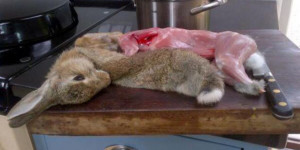More than 140 people fell ill after dining at Flicks Restaurant in Belfast during a three-month period in 2012.
 An investigation by the Public Health Agency (PHA) found chopped parsley, used to garnish dishes, had not been adequately washed or refrigerated to kill bacteria.
An investigation by the Public Health Agency (PHA) found chopped parsley, used to garnish dishes, had not been adequately washed or refrigerated to kill bacteria.
The disclosure comes as the owners of the restaurant, which is now closed, were fined £110,000 after admitting a series of hygiene breaches.
The PHA report said: “Staff assumed the parsley, which originated in the eastern and western Mediterranean, was supplied to the restaurant as a ready to eat product but this was not the case.
“Washing of the parsley to remove contamination was therefore not identified as a critical control point.
“There was evidence of failure to comply with the legal requirement to keep the prepared parsley refrigerated and this could have facilitated the growth of micro-organisms.”
Not sure what washing would do.
There were 141 clinically confirmed cases of E.coli during the outbreak; 19 people were admitted to hospital and a further 159 presented symptoms.
 The PHA said poor practices within the restaurant contributed to the spread of the bacteria and that some meals may have been garnished by a food handler who had contracted E.coli.
The PHA said poor practices within the restaurant contributed to the spread of the bacteria and that some meals may have been garnished by a food handler who had contracted E.coli.
Staff toilet facilities were found to be inadequate with no soap or drying facilities.
The restaurant closed voluntarily on October 11, 2012, following advice from the Belfast City Council’s environmental health staff.
In a statement, Belfast City Council said the case highlighted the dangerous consequences of hygiene failures.
Flicks owner Michael McAdam told the BBC he was “devastated” that people had become sick.
He said: “I am personally devastated that any business of mine could have caused people to become ill.
“I would just like to take this opportunity, once again, to say how deeply sorry I am to anyone who fell ill as a result of eating at Flicks restaurant.”
The restaurant is not expected to re-open.
 They’re natural and groovy, but also microbiologically messy.
They’re natural and groovy, but also microbiologically messy.






